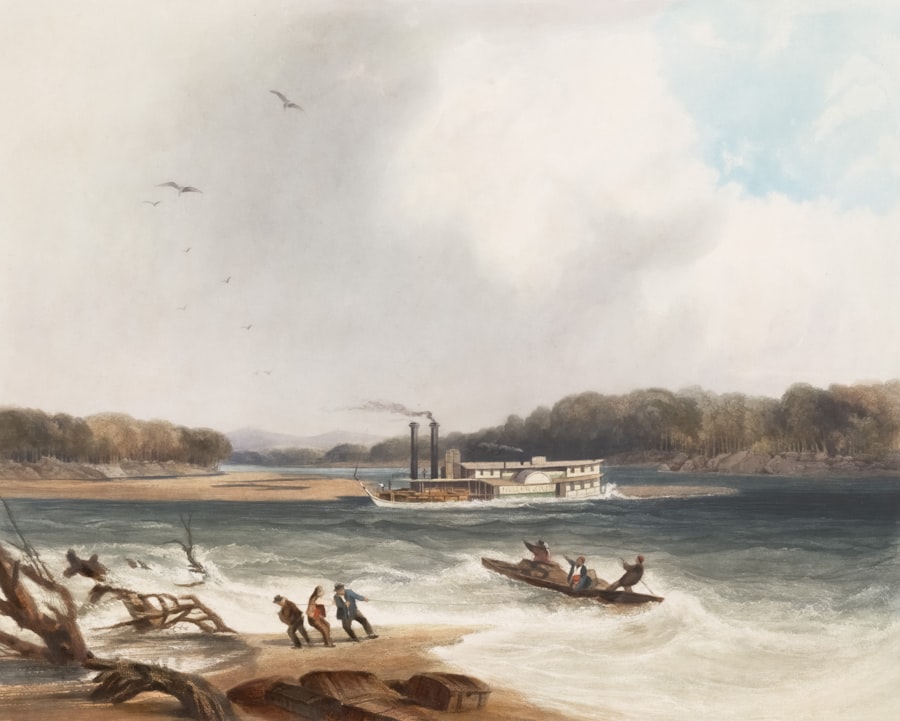The Mississippi River, often referred to as the lifeblood of the American heartland, played a pivotal role during the Civil War. Stretching over 2,300 miles, it served as a crucial artery for transportation, commerce, and military strategy. The river’s vast expanse not only defined the geography of the United States but also became a focal point in the conflict between the Union and the Confederacy.
As both sides recognized its significance, control of the Mississippi River emerged as a primary objective, influencing military tactics and shaping the course of the war. The river’s importance was underscored by its ability to facilitate movement and supply across vast distances. It connected various states and regions, making it an essential route for transporting troops, weapons, and provisions.
As the war unfolded, the struggle for dominance over this vital waterway would have far-reaching implications for both the Union and the Confederacy.
Key Takeaways
- The Mississippi River played a crucial role in the Civil War, serving as a strategic objective for both the Union and the Confederacy.
- Control of the Mississippi River was a key strategic objective for the Union, as it would split the Confederacy in two and cut off vital supply lines.
- The Union made significant efforts to gain control of the Mississippi River, including the capture of key cities and the use of naval power.
- The Confederacy defended the Mississippi River fiercely, utilizing fortifications and naval forces to protect this vital waterway.
- The Mississippi River was of immense importance for transportation and supply lines, serving as a crucial artery for moving troops and supplies during the Civil War.
Control of the Mississippi River as a strategic objective
From the outset of the Civil War, control of the Mississippi River was recognized as a strategic objective by both sides. For the Union, seizing this critical waterway meant cutting off supplies and reinforcements to Confederate forces in the West. The river served as a natural barrier that divided the Confederacy, making it imperative for Union forces to secure its banks.
The Confederacy, on the other hand, understood that losing control of the river would severely hinder their ability to transport goods and troops, ultimately threatening their war effort. The significance of the Mississippi River extended beyond mere logistics; it represented a psychological advantage as well. Control over this vital resource would not only disrupt enemy operations but also bolster morale among troops and civilians alike.
The Union’s strategy aimed to exploit this advantage by implementing a series of military campaigns designed to wrest control of the river from Confederate hands. As both sides prepared for battle, the stakes were high, and the outcome would shape the future of the nation.
The Union’s efforts to gain control of the Mississippi River

The Union’s efforts to gain control of the Mississippi River were marked by a series of ambitious military campaigns and naval operations. One of the earliest attempts was the capture of Fort Henry and Fort Donelson in early 1862, which opened up a pathway for Union forces into Tennessee and further south along the river. These victories not only demonstrated the effectiveness of Union strategy but also provided a morale boost to Northern troops eager to secure a decisive advantage.
Following these initial successes, General Ulysses S. Grant emerged as a key figure in the Union’s campaign for control of the Mississippi River. His relentless pursuit of Confederate forces culminated in a series of battles that aimed to secure key locations along the river.
The Union Navy also played a crucial role in this endeavor, employing ironclad warships to challenge Confederate defenses and ensure safe passage for troop transports. The combination of land and naval forces allowed the Union to establish a foothold along the river, setting the stage for further advances.
The Confederacy’s defense of the Mississippi River
| Location | Defense Strategy | Outcome |
|---|---|---|
| Vicksburg, Mississippi | Fortifications and artillery placements along the river | Union victory after a long siege in 1863 |
| Port Hudson, Louisiana | Fortifications and artillery placements along the river | Union victory after a siege in 1863 |
| Memphis, Tennessee | Gunboats and river patrols | Union victory in 1862 |
In response to Union advances, the Confederacy mounted a determined defense of the Mississippi River. Recognizing its strategic importance, Confederate leaders fortified key positions along its banks, including Vicksburg and Port Hudson. These strongholds were equipped with artillery and manned by seasoned troops, creating formidable obstacles for Union forces attempting to gain control.
The Confederacy understood that holding these positions was essential not only for maintaining supply lines but also for preserving their territorial integrity. The defense of Vicksburg became particularly critical as it was situated on a high bluff overlooking a key bend in the river. Confederate General John Pemberton was tasked with holding this vital position against Grant’s advancing forces.
The Confederacy’s commitment to defending Vicksburg exemplified their resolve to maintain control over the river at all costs. However, despite their efforts, they faced significant challenges as Union forces employed siege tactics that would ultimately lead to their downfall.
The importance of the Mississippi River for transportation and supply lines
The Mississippi River’s importance as a transportation route cannot be overstated. It served as a major artery for moving troops, supplies, and equipment throughout the war. For both sides, controlling this waterway meant ensuring that their armies were well-supplied and capable of sustaining prolonged engagements.
The river facilitated not only military logistics but also commerce, allowing goods to flow between regions that were otherwise isolated by conflict. For the Union, securing control over the Mississippi River meant disrupting Confederate supply lines and isolating Southern states from one another. This strategic advantage allowed Union forces to cut off resources that were vital for sustaining Confederate armies.
Conversely, for the Confederacy, maintaining access to the river was essential for transporting cotton and other goods to markets in Europe and elsewhere. The economic implications of controlling this waterway were profound, influencing both military strategy and civilian life throughout the war.
The impact of the Union’s control of the Mississippi River on the Confederacy

The Union’s eventual control of the Mississippi River had devastating consequences for the Confederacy. With key strongholds like Vicksburg falling into Union hands in July 1863, Southern forces found themselves increasingly isolated from one another. This loss not only disrupted supply lines but also diminished morale among Confederate troops who relied on access to resources from different regions.
The psychological impact of losing such a vital asset was felt throughout the South. Moreover, with control over the river secured, Union forces could launch coordinated offensives against Confederate positions in Arkansas, Louisiana, and Mississippi.
The loss of access to this critical transportation route marked a turning point in the war, as it became increasingly difficult for Confederate leaders to maintain effective communication and coordination among their forces.
The significance of the Mississippi River in dividing the Confederacy
The Mississippi River served as more than just a physical barrier; it became a symbolic divide between Northern and Southern states during the Civil War. By gaining control over this waterway, Union forces effectively split the Confederacy in two, isolating states like Texas, Arkansas, and Louisiana from their eastern counterparts. This division had profound implications for Confederate strategy and resource allocation, as it became increasingly challenging to coordinate efforts across such a vast expanse.
The psychological ramifications of this division were equally significant. As Southern states found themselves cut off from one another, doubts began to creep into their ranks regarding their ability to sustain a prolonged conflict against an increasingly organized and resourceful Union army. The loss of unity among Confederate states weakened their resolve and contributed to growing discontent among both soldiers and civilians alike.
The role of the Mississippi River in the Anaconda Plan
The Anaconda Plan was a strategic blueprint devised by Union leaders aimed at suffocating the Confederacy economically and militarily. Central to this plan was control over key waterways, particularly the Mississippi River. By blockading Southern ports and securing control over this vital river system, Union forces sought to cut off supplies and reinforcements from reaching Confederate troops.
This strategy aimed not only to weaken Southern military capabilities but also to undermine their economy. The Anaconda Plan emphasized a gradual approach to victory rather than an immediate confrontation with Confederate forces. By encircling and isolating key regions through control of waterways like the Mississippi River, Union leaders believed they could force a surrender without incurring heavy casualties on either side.
This methodical strategy ultimately proved effective as it allowed Union forces to chip away at Confederate resources while maintaining pressure on their military operations.
The Battle of Vicksburg and its impact on the Civil War
The Battle of Vicksburg stands out as one of the most significant engagements during the Civil War due to its strategic implications for control over the Mississippi River. Fought from May 18 to July 4, 1863, this grueling siege culminated in a decisive victory for Union forces under General Grant. The fall of Vicksburg marked a turning point in the war; it not only secured complete control over the Mississippi River but also bolstered Northern morale at a time when victories were desperately needed.
The impact of Vicksburg extended beyond immediate military gains; it shifted momentum in favor of the Union cause. With Vicksburg under their control, Union forces could now move freely along the river, facilitating troop movements and supply lines throughout the region. This victory also had profound psychological effects on both sides; it demonstrated that Southern defenses could be breached and that victory was attainable for Union forces committed to their cause.
The economic significance of the Mississippi River during the Civil War
The economic significance of the Mississippi River during the Civil War cannot be understated. As a major transportation route for goods and resources, it played an essential role in sustaining both military operations and civilian life throughout the conflict. For Southern states reliant on agriculture—particularly cotton—the river served as a critical conduit for exporting goods to international markets.
Control over this waterway directly impacted economic stability in both regions. For the Union, securing access to this vital resource meant disrupting Confederate trade routes while simultaneously enhancing their own economic capabilities. By controlling key ports along the river and implementing blockades against Southern shipping routes, they effectively stifled Confederate commerce and weakened their economy over time.
This economic warfare contributed significantly to undermining Southern resolve as resources dwindled and inflation soared.
The legacy of the Mississippi River’s strategic importance in the Civil War
The legacy of the Mississippi River’s strategic importance during the Civil War endures long after its conclusion. Its role as a critical transportation route shaped military strategies on both sides while influencing political decisions that would resonate throughout American history. The lessons learned from controlling this vital waterway informed future military campaigns and highlighted how geography could dictate outcomes in warfare.
Moreover, the impact of controlling such an essential resource extended into post-war America as well. The reconstruction efforts that followed relied heavily on restoring trade routes along rivers like the Mississippi to revitalize regional economies devastated by conflict. Ultimately, understanding how pivotal this waterway was during one of America’s most tumultuous periods provides valuable insights into both historical events and contemporary discussions surrounding infrastructure development and resource management today.
The strategic importance of the Mississippi River during the Civil War cannot be overstated, as it was a critical artery for transportation and supply routes. Control of the river allowed the Union forces to split the Confederacy in two, disrupting their supply lines and weakening their ability to sustain the war effort. For a deeper understanding of the geographical significance of the Mississippi River and its impact on historical events, you can explore a related article on MyGeoQuest. This resource provides insights into how geography has shaped historical outcomes, including the pivotal role of the Mississippi River during the Civil War.
WATCH THIS! The Hidden Reason No One Can Invade America | A Geographical Analysis
FAQs
What is the strategic importance of the Mississippi River during the Civil War?
The Mississippi River was a vital transportation route for the movement of troops and supplies during the Civil War. Controlling the river was crucial for both the Union and the Confederacy in order to maintain supply lines and strategic positioning.
How did the control of the Mississippi River impact the outcome of the Civil War?
The Union’s successful control of the Mississippi River split the Confederacy in half, effectively cutting off crucial supply lines and isolating Confederate forces in the western theater. This significantly weakened the Confederacy and contributed to their eventual defeat.
What were the key battles and campaigns fought for control of the Mississippi River?
Key battles and campaigns for control of the Mississippi River included the Battle of Vicksburg, the Siege of Vicksburg, and the Battle of Memphis. These engagements were pivotal in the Union’s efforts to gain control of the river and ultimately secure a strategic advantage in the war.
How did the strategic importance of the Mississippi River impact the overall war strategy for both the Union and the Confederacy?
The control of the Mississippi River was a central component of the Union’s Anaconda Plan, which aimed to suffocate the Confederacy by cutting off its supply lines. For the Confederacy, maintaining control of the river was crucial for maintaining communication and supply routes between the eastern and western theaters of the war.
What were the long-term effects of the Union’s control of the Mississippi River after the Civil War?
The Union’s control of the Mississippi River had long-term economic and strategic implications, as it facilitated the expansion of trade and commerce in the region. Additionally, it helped to solidify the Union’s victory and establish federal authority over the former Confederate states.
